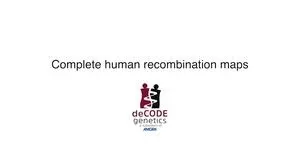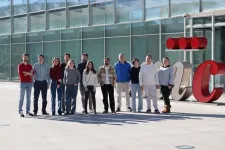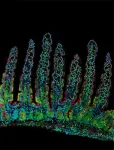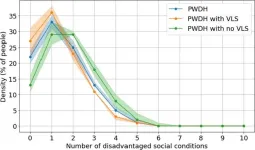(Press-News.org) Complete recombination map of the human genome, a major step in genetics
Scientists at deCODE genetics/Amgen have constructed a complete map of how human DNA is mixed as it is passed down during reproduction. The map marks a major step in the understanding of genetic diversity and its impact on health and fertility. It continues 25 years of research at deCODE genetics into how new diversity is generated in the human genome, and its relationship to health and disease.
The new map, appearing today in the online edition of Nature, is the first to incorporate shorter-scale shuffling, (non crossover) of grandparental DNA, which is difficult to detect due to the high DNA sequence similarity. The map also identifies areas of DNA that are devoid of major reshuffling, likely to protect critical genetic functions or prevent chromosomal problems. This insight offers a clearer picture of why some pregnancies fail and how the genome balances diversity with stability.
While this shuffling, known as recombination, is essential for genetic diversity, errors in the process can lead to serious reproductive issues. These failures can result in genetic errors that prevent pregnancies from continuing, helping to explain why infertility affects around one in ten couples worldwide. Understanding this process offers new hope for improving fertility treatments and diagnosing pregnancy complications.
The research also reveals key differences between men and women in how and where, the genome recombination occurs. Women have fewer non-crossover recombinatios, but their frequency increases with age, which may help explain why older maternal age is associated with higher risks of pregnancy complications and chromosomal disorders of the child. Men, however, do not show this age-related change, although recombination in both sexes can contribute to mutations passed to offspring.
Understanding the recombination process is also important in understanding how humans evolved as a species and what shapes individual differences, including health outcomes. All human genetic diversity can be traced to recombination and de novo mutations, DNA sequence present in the child but not in the parents. The map shows that mutations are elevated near regions of DNA mixing and consequently that the two processes are highly correlated.
-----
Based in Reykjavik, Iceland, deCODE genetics is a global leader in analyzing and understanding the human genome. Using its unique expertise and population resources, deCODE has discovered genetic risk factors for dozens of common diseases. The purpose of understanding the genetics of disease is to use that information to create new means of diagnosing, treating and preventing disease. deCODE genetics is a wholly-owned subsidiary of Amgen (NASDAQ:AMGN).
Contact:
Thora Kristin Asgeirsdottir
Head of Communications
deCODE genetics
Sturlugata 8
102 Reykjavík
Iceland
Tel: +354 570 1909
Mobile: +354 894 1909
END
Complete recombination map of the human-genome, a major step in genetics
Scientists at deCODE genetics/Amgen have constructed a complete map of how human DNA is mixed as it is passed down during reproduction
2025-01-22
ELSE PRESS RELEASES FROM THIS DATE:
Fighting experience plays key role in brain chemical’s control of male aggression
2025-01-22
Like humans, mice will compete over territory and mates, and show increased confidence in their fighting skills the more they win. At first, a brain chemical called dopamine is essential for young males to master this behavior. But as they gain experience, the chemical grows less important in promoting aggression, a new study shows.
Dopamine has been linked to male aggression for decades. How past experiences might influence this relationship, however, had until now been unclear.
In experiments in rodents, a team led by researchers at NYU Langone Health boosted activity in dopamine-releasing cells in a part of the brain called the ventral tegmental area. The findings revealed that in ...
Trends in preventive aspirin use by atherosclerotic cardiovascular risk
2025-01-22
About The Study: Following landmark clinical trials and changes in guideline recommendations, self-reported primary prevention aspirin use decreased among older adults and adults with low atherosclerotic cardiovascular disease (ASCVD) risk for whom aspirin was not recommended, but also decreased among adults with higher ASCVD risk for whom aspirin may still be recommended. Despite these reductions, many patients with limited likelihood to benefit reported continuing to take aspirin.
Corresponding Author: To contact the ...
Sex differences in long COVID
2025-01-22
About The Study: This study found that female sex was associated with an increased risk of long COVID compared with male sex, and this association was age, pregnancy, and menopausal status dependent. These findings highlight the need to identify biological mechanisms contributing to sex specificity to facilitate risk stratification, targeted drug development, and improved management of long COVID.
Corresponding author: To contact the corresponding author, Dimpy P. Shah, M.D., Ph.D., email ShahDP@uthscsa.edu.
To ...
Medically recommended vs nonmedical cannabis use among US adults
2025-01-22
About The Study: The results of this study showed that adults ages 18 to 49 reporting medical-only or medical-nonmedical cannabis use vs nonmedical-only use had higher prevalence of cannabis use disorder at all severity levels and reported more frequent cannabis use. These findings suggest that medically recommended cannabis is not associated with reduced addiction risk compared with nonmedical use.
Corresponding author: To contact the corresponding author, Nora D. Volkow, M.D., email nvolkow@nida.nih.gov.
To access the embargoed study: ...
Spanish scientists discover how the gut modulates the development of inflammatory conditions
2025-01-22
A study led by David Sancho at the Centro Nacional de Investigaciones Cardiovasculares (CNIC) in Madrid reveals how an increase in intestinal permeability allows the natural gut bacteria to cross the intestinal barrier and reach the bone marrow, where they induce epigenetic changes—modifications that alter gene activity without affecting DNA sequence—in the stem cells that give rise to immune cells. The epigenetic changes induced by the translocated gut bacteria generate “trained” immune cells primed to respond more efficiently to future infections. However, this same ability to amplify the immune response can also aggravate the inflammatory conditions such as ...
Compact comb lights the way for next-gen photonics
2025-01-22
In the world of modern optics, frequency combs are invaluable tools. These devices act as rulers for measuring light, enabling breakthroughs in telecommunications, environmental monitoring, and even astrophysics. But building compact and efficient frequency combs has been a challenge—until now.
Electro-optic frequency combs, introduced in 1993, showed promise in generating optical combs through cascaded phase modulation but progress slowed down because of their high power demands and limited bandwidth. This led to the field being dominated by femtosecond lasers and Kerr soliton microcombs, which, while effective, require complex tuning and ...
New research reveals how location influences how our immune system fights disease
2025-01-22
Seattle, WASH.—January 22, 2025—The human immune system is like an army of specialized soldiers (immune cells) each with a unique role to play in fighting disease. In a new study published in Nature, led by scientists at the Allen Institute, La Jolla Institute for Immunology, and UC San Diego, researchers reveal how cells known as tissue-resident memory CD8 T cells, play unique and specialized roles based on where they are located within the small intestine. Tissue-resident memory cells provide a local first ...
AI in cell research: Moscot reveals cell dynamics in unprecedented detail
2025-01-22
Thanks to a new technology called Moscot (“Multi-Omics Single-Cell Optimal Transport”), researchers can now observe millions of cells simultaneously as they develop into a new organ—for example, a pancreas. This groundbreaking method was developed by an international research team led by Helmholtz Munich and has been published in the renowned journal Nature.
Until now, biologists had only a limited understanding of how cells develop in their natural environment—for instance, when they form an organ in the ...
New study finds social programs could reduce the spread of HIV by 29%
2025-01-22
January 22, 2025
New Study Finds Social Programs Could Reduce the Spread of HIV by 29%
Although HIV was used as a case study, the UMass Amherst researchers say their assessment tool has applications for other diseases
AMHERST, Mass. — Researchers at the University of Massachusetts Amherst have quantified the impacts of a constellation of social factors on the spread of HIV. Their study, published in Health Care Management Science, found that a hypothetical 100% effective intervention addressing barriers to HIV treatment and care from depression, homelessness, ...
SIDS discovery could ID babies at risk of sudden death
2025-01-22
New University of Virginia School of Medicine research revealing the fingerprints of Sudden Infant Death Syndrome within blood samples could open the door to simple tests to identify babies at risk.
The findings also represent an important step forward in unraveling the causes of SIDS, an unexplained condition that is the No. 1 killer of babies between amonth and a year old.
The UVA researchers analyzed blood serum samples collected from infants who died ...
LAST 30 PRESS RELEASES:
Smithsonian planetary scientists discover recent tectonic activity on the Moon
Government censorship of Chinese chatbots
Incorporating a robotic leg into one’s body image
Brain imaging reveals how wildlife photos open donor wallets
Wiley to expand Advanced Portfolio
Invisible battery parts finally seen with pioneering technique
Tropical forests generate rainfall worth billions, study finds
A yeast enzyme helps human cells overcome mitochondrial defects
Bacteria frozen in ancient underground ice cave found to be resistant against 10 modern antibiotics
Rhododendron-derived drugs now made by bacteria
Admissions for child maltreatment decreased during first phase of COVID-19 pandemic, but ICU admissions increased later
Power in motion: transforming energy harvesting with gyroscopes
Ketamine high NOT related to treatment success for people with alcohol problems, study finds
1 in 6 Medicare beneficiaries depend on telehealth for key medical care
Maps can encourage home radon testing in the right settings
Exploring the link between hearing loss and cognitive decline
Machine learning tool can predict serious transplant complications months earlier
Prevalence of over-the-counter and prescription medication use in the US
US child mental health care need, unmet needs, and difficulty accessing services
Incidental rotator cuff abnormalities on magnetic resonance imaging
Sensing local fibers in pancreatic tumors, cancer cells ‘choose’ to either grow or tolerate treatment
Barriers to mental health care leave many children behind, new data cautions
Cancer and inflammation: immunologic interplay, translational advances, and clinical strategies
Bioactive polyphenolic compounds and in vitro anti-degenerative property-based pharmacological propensities of some promising germplasms of Amaranthus hypochondriacus L.
AI-powered companionship: PolyU interfaculty scholar harnesses music and empathetic speech in robots to combat loneliness
Antarctica sits above Earth’s strongest “gravity hole.” Now we know how it got that way
Haircare products made with botanicals protects strands, adds shine
Enhanced pulmonary nodule detection and classification using artificial intelligence on LIDC-IDRI data
Using NBA, study finds that pay differences among top performers can erode cooperation
Korea University, Stanford University, and IESGA launch Water Sustainability Index to combat ESG greenwashing
[Press-News.org] Complete recombination map of the human-genome, a major step in geneticsScientists at deCODE genetics/Amgen have constructed a complete map of how human DNA is mixed as it is passed down during reproduction





